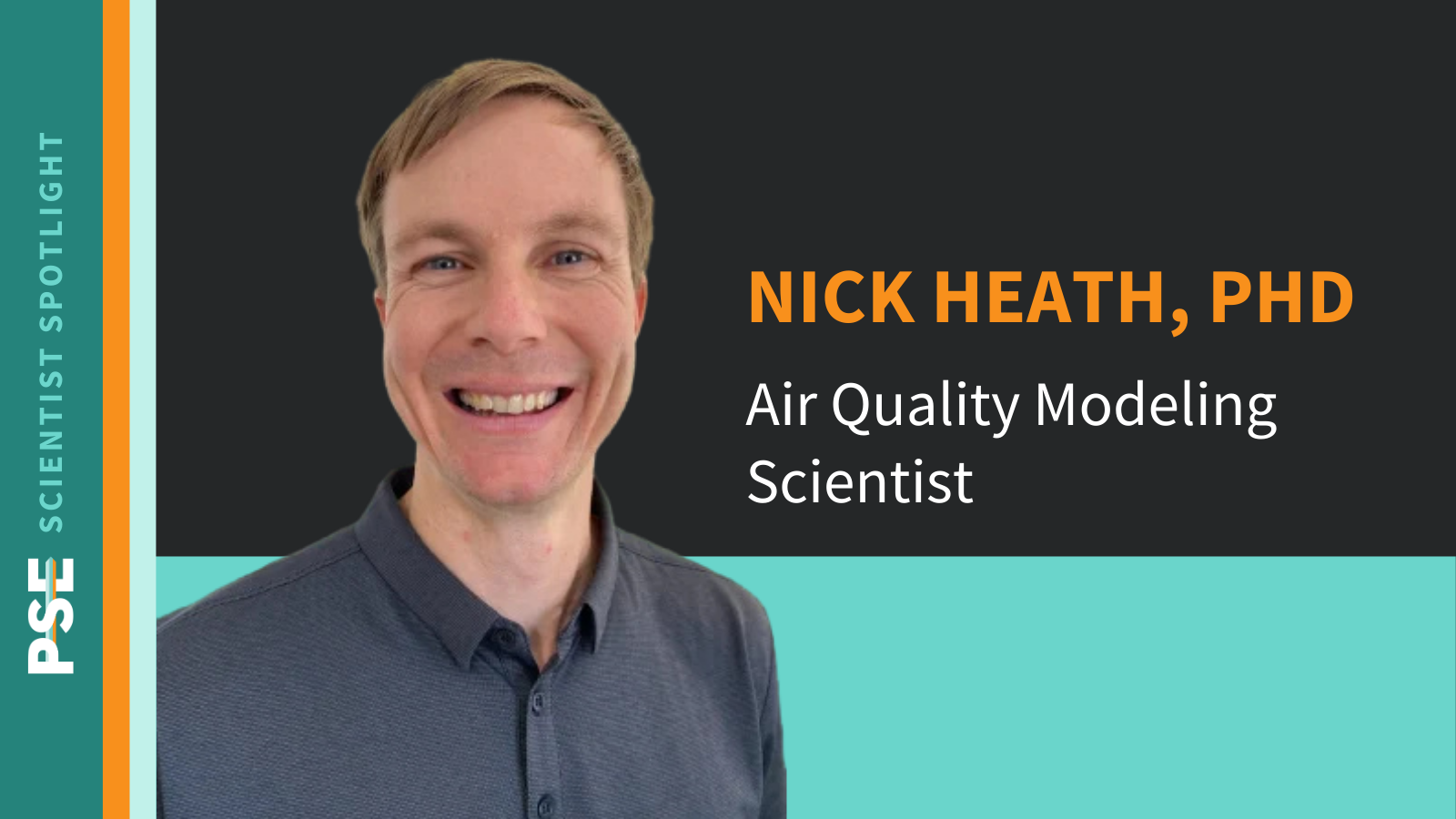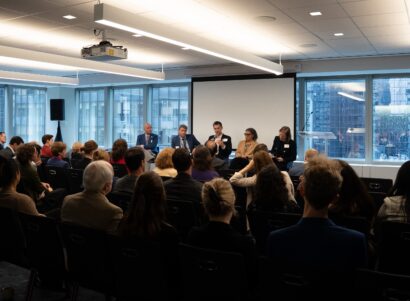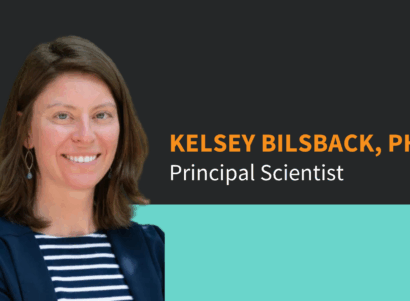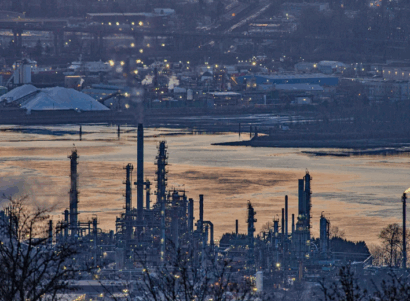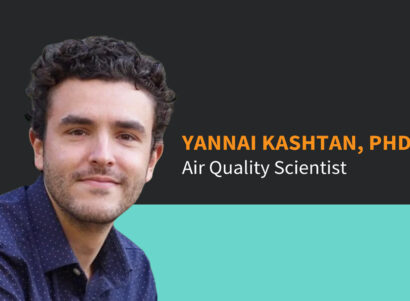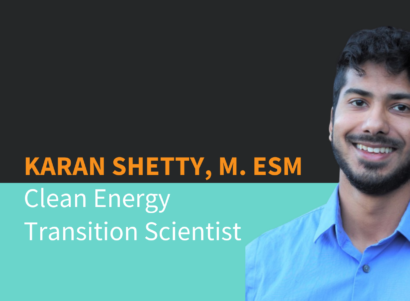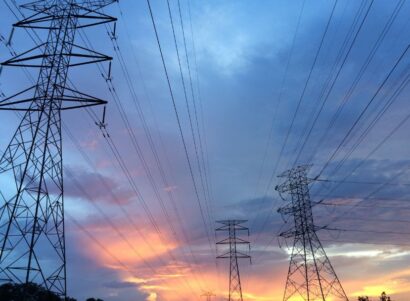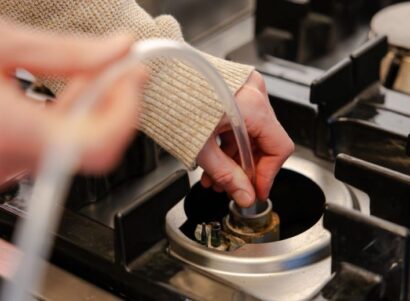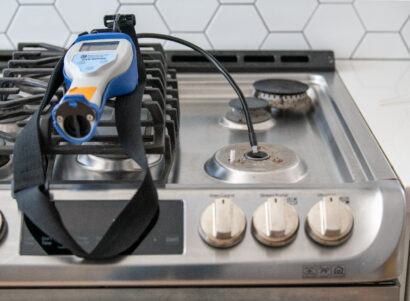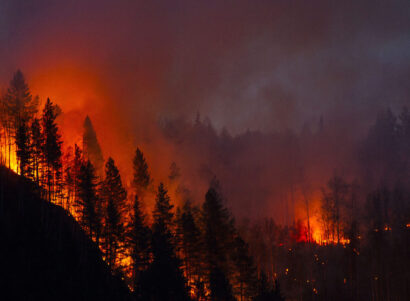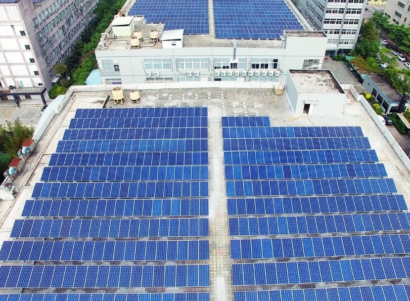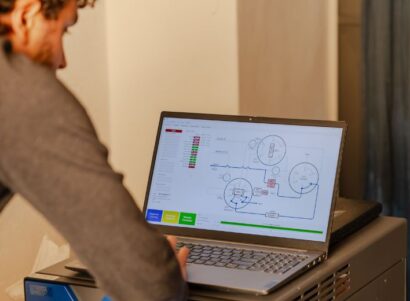Meet Nick Heath, PhD, an Air Quality Modeling Scientist at PSE Healthy Energy who runs the models that make it possible to understand how emissions from methane gas affect air quality.
Q: What do you do here at PSE?
A: I’ve been working at PSE for about a year now as an Air Quality Modeling Scientist, which means that I pair data and observations with models to study how different emissions impact human health. I work with all the different teams, get their input for the models and then I run the models. I get the output back to the team so they can analyze it and make meaning out of it.
Q: What’s your scientific background?
A: I’m a meteorologist by training, and I got into meteorology through surfing. I was at a community college and I was a surf bum–just obsessed with surfing all the time. So I would surf all day and work as a garbage man for my uncle’s trash collection business at night to pay the bills. And I really didn’t like that job so I was thinking, what could I do in this school I’m attending? Well, I was always watching the Weather Channel to see when the waves would be best, and I figured I have to pick a major, so why not do meteorology? And once I made that decision, something flipped in my brain, and I became a 100% committed student.
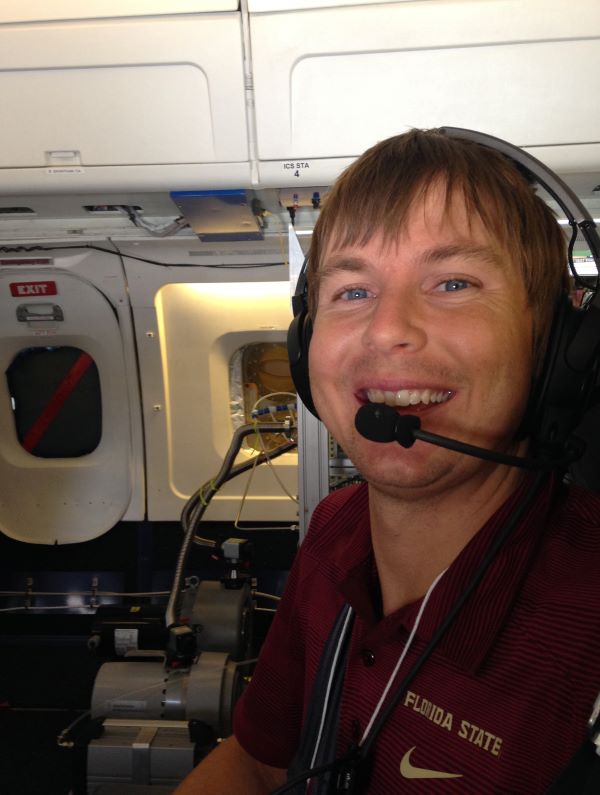
Nick flying on a plane to gather air quality data during NASA’s Student Airborne Research Program. Photo courtesy of Nick Heath.
So I went from Florida Community College of Jacksonville (now called Florida State College at Jacksonville) to Florida State to study meteorology. I was able to study ocean waves as an undergraduate. I got really lucky with amazing professors and mentors so I stayed at Florida State for my Master’s degree. I got an internship with NASA’s Student Airborne Research Program, which a few other teammates at PSE have done. That internship was where I learned that I could apply what I was doing in weather and meteorology to air quality and pollution.
That was a major turning point in where I went with my research. I was all-in on air quality and decided to pursue a PhD because one of my professors offered to bring me on as a graduate student. My dissertation was related to how thunderstorms transport pollution, and I did my post-doc work at the EPA.
Q: What was it about air quality and air pollution that captured your attention?
A: Honestly, it was all new to me. I was learning about air pollution and I thought, “Oh my gosh. People breathe all this stuff?” I had no clue about any of it. So for me, it was a place where my skills could help people. Today I understand another side of it. I’ve been a meditation and breathing coach for about seven or eight years, so now I’m really focused on what’s going into my body when I breathe. But at the time, it just seemed like a great fit for me.
Q: Tell me more about your breathwork coaching.
A: I’m a type one diabetic, and so I’ve always been trying to improve my health. I came into breath work and breathing about seven or eight years ago, and it helped my diabetes, my stress, it helped everything. So I started reading science papers about it, trying to figure it out. And then I got certified as a coach and started sharing online. It’s a hobby and a passion. I love helping people learn how to stress less. I mean, if I get stressed out, even if I have a bad dream, I’ll wake up with my blood sugar high because it activates the sympathetic nervous system or releases all these stress hormones. It increases glucose, because it’s putting you in fight or flight. So it’s really bad for blood sugar. If you can reduce stress, it can be helpful for your life in general, obviously, but also very important for managing diabetes.
Q: Do you see a throughline between your breathwork coaching and your work here at PSE?
A: Yes, that was a huge part of wanting to work here at PSE. So I found breathing, like I said, seven or eight years ago. So when I was looking for a job, I really wanted to do something that had to do with helping improve air quality. I’m so obsessed with breathing now and focusing on my breath and changing my breath to improve my health. We take 20,000 breaths today, right? Breathing crappy air hurts our health. We need to fix that.
Q: So what do you do on a typical day here at PSE?
A: Well the biggest question I’m trying to answer right now is, “how do emissions from the oil and gas industry affect the air we breathe, and impact our health?” So on a typical day, I do a lot of coding and running models to help answer that question. One of my big tasks is to make things efficient. We have all these models that are validated, they work well, but to run them can be cumbersome. So I spend a lot of time figuring out how we can run them, start to finish, in a fast way, so we can generate the data we need quickly to be responsive to current events and our partners. So it’s a lot of coding and a lot of data analysis, writing scripts and ways to analyze that data in a meaningful way.
Q: Tell me more about the value of models.
A: Models help fill the gaps in the observations we have. We can’t monitor everything all the time, and that makes it hard to know what’s happening in the world. So we use models based on scientific principles, physical principles, thermodynamics, chemistry–everything we know–to simulate, to the best of our ability, what happened or what will happen based on all the information we do know. I do a lot of coding to make these models work and to bring together different areas of inquiry.
Q: What would you say is the most rewarding part of your work as a scientist?
A: Using the best of our knowledge, the skills, and different tools to address problems in ways that can actually help people.
Q: What’s something that you love about your work at PSE?
A: The people, for sure. I’ve never been around so many genuinely nice, smart people. And also the mission. Knowing that the stuff we do actually gets out to the world. It’s rare, I think, for there to be such an emphasis on translating science into something meaningful for regular people. Getting to work on projects that are technically challenging is also intrinsically rewarding. I have micro goals every day and the things I work on will actually help people, so it’s very unique.
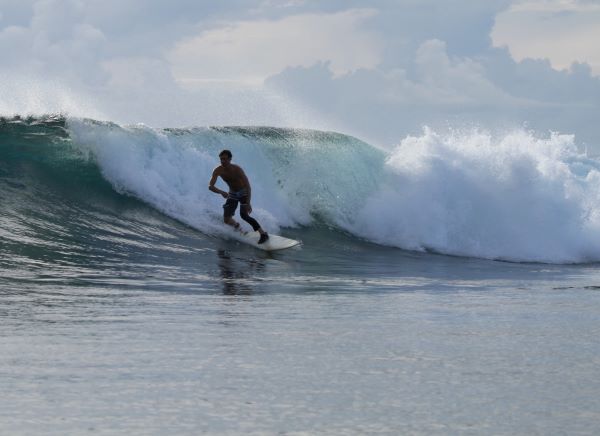
Nick catching a wave at “4 Bobs” in the Mentawai Islands in Indonesia. Photo courtesy of Nick Heath.
Q: And what is it that you love about surfing?
A: It’s just a blast. You never get the same wave twice, right? You’re relying on Mother Nature. So if Mother Nature gives me waves, it almost feels disrespectful not going to surf them. It can be hard if I have plans already, and the conditions are perfect for surfing and I have to break my plans. Sometimes I feel like I don’t have a choice! When you surf, you often see some sort of wildlife, mostly dolphins and sharks, which is sometimes a little scary. And surfing is also physically really challenging. It’s like yoga, meditation, and high-intensity exercise all in one. And there’s a huge community around it and it encourages me to travel. I’ve been to Costa Rica, Puerto Rico, California and Indonesia–places I might not go otherwise–just chasing waves.

Nick before he discovered his second love, meteorology. Photo courtesy of Nick Heath
Q: It’s a jump to go from surfer dude to doctoral candidate. Were you naturally very good at math and science?
A: I was not. Honestly, I was a mediocre student most of my life. When I decided I wanted to do meteorology, I went to the guidance counselor to say, “Hey, this is what I want to do. Can you show me the curriculum I need to get into? How would I get into FSU?” I was a blonde surfer bum, and she basically laughed in my face. And even though I’m a laid back guy, I’m pretty stubborn. It frustrated me. In hindsight, I don’t blame her, but sometimes I joke that the whole reason I got a PhD was just to prove that guidance counselor wrong. So I put a lot of time into it. Math suddenly became interesting when I applied it to something cool. I got through calculus one, two and three and partial differential equations and all these intense math classes solely because I studied really hard. I knew the end goal I wanted, so it was worth it.
Q: What would you tell young people about pursuing a career in scientific research?
A: I would say, try it. As early as you can, try to get involved in a research project. Go through the process of learning how to identify gaps in knowledge and how to apply principles to solve a problem. You can’t fail in science. As long as you’re applying principles and you’re doing the work you always learn something even if it’s not what you thought you were going to learn.
